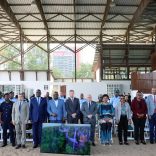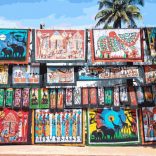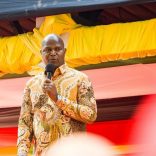Mozambique faces 'silent and destructive adversary' in illegal fishing - FAO
Why is it that in Mozambique we can sell land and houses in the city, but not the countryside? asks João Carrilho

OMRA
A Verdade reports that, although the land law in force in our country is generally accounted good for society in general, some authorities consider it outdated for current realities. João Carrilho said that the legal provision should be rethought and recalled that the constitutional norm that “land should not be sold, or otherwise alienated” is inspired by a 1917 law proclaimed by the first Soviet Congress.
This is a position shared by Antonio Francisco who recalled the African proverb “when whites came to our land, we had the land and they had the bible, now we have the bible and they have the land.” A professor of economics, Francisco asked: “After the whites left, who got the land?”
The professor’s reflections took place last Wednesday (May 24) during a well-attended conference organised by the Observatory of the Rural Environment (OMR) and aimed at discussing the diversification of the Mozambican economy “from the structural point of view, focusing on agriculture”.
Engineer João Carrilho, a former member of the Frelimo ruling party, noted that in Mozambique there are 80 million hectares of land, of which 36 million hectares are arable. “The family [farming] sector, which makes 99.6 percent of farmers, has 5 million hectares. Why is it that they cannot have this land for themselves? There are still 75 million hectares left.”
Carrilho said that the state should only regulate when they are able to manage effectively, and argued that “approximately 7 million hectares have been handed over to large enterprises, but less than 1 million hectares are being used. What about the rest? We didn’t conduct an inspection, so we don’t know what happened”.
“I believe it was on October 10, 1917, that the Congress of the Soviets decided that the land belongs to the state and could not be bought or sold or otherwise alienated. Does that not seem familiar?” Carrilho asked with reference to paragraph 2 of article 109 of the Constitution of the Republic of Mozambique. In his view, it is necessary to “rethink things” because “when a law is not legitimate, it is violated”.
In fact, land is bought, sold and resold every day in clear violation of the law and with the complicity of the government.
“Why is it that the rural citizen can not have a land that belongs to him or her?”
In Carrilho’s view, it is necessary to “revisit the problem of private ownership of land. How is could be implemented, how it could be done”.
“I think there are some places in our country where the land has to be private. I know how other countries that have private property work, where when the state needs the land it goes there and takes it.”
“In Brazil, for example, there is expropriation. When the state has a public interest in getting the land, it does an expropriation, that is to say, it takes the land from that individual and gives him compensation,” the academic said. Also in Brazil, “it is forbidden to cut down so many hectares of forest, even if it is private property. If the private owner chooses to cut down the forest, he is expropriated by the state”.
“Why is it that our rural citizens cannot have land of their own? Because in the city we can sell and the land goes along with the house but not in the countryside. I think that this is a problem of citizenship of our country. We have first class citizens in the city, and the second class citizens in rural areas,” Carrilho said, adding that he had long been concerned by the matter. “If people had something that was their own, that would bolster identity, and also as a country. As a the proverb has it: ‘The land that I work is my country.’ If you do not have land, you do not have a country.”
“It is illegitimate that the state should own the land.”

In turn Professor Antonio Francisco sees current land law in Mozambique as cynical and as making a problem out of property rights.
“In Eduardo Mondlane’s book ‘Fight for Mozambique’ there is the saying ‘When whites came to our land, we had the land and they had the bible. Now we have the bible and they have the land.’ I ask and then the whites left and who got the land? “
Francisco has no doubts that “after the whites left I think for at least a decade the Mozambicans were left without the bible and without the land”.
“In the rural development strategy, it was possible to present the proposal of separating the land distribution areas into community, public, commercial, etc., but it was a difficult subject to debate. What I think hinders this in terms of relations is the possibility that the land will in practice later be at the disposal of bureaucrats and politicians,” Francisco said during his presentation at the OMR conference.
“I attended a community meeting a few years ago to discuss the assignment of a land. There is complete humiliation for the smallholder. You go there, you call the so-called community, and here come the district officials, who each get 2,750 meticais to come the meeting, and the investor is required to give 300 meticais to the community and a flagon of wine. There is a process of discussion with the community and then the investor has to agree to give bags of cement or other goods to the community,” Francisco said.
From his perspective, “If we take our experience in giving back real estate to citizens, we do not speak of housing conflicts today. Of course there are private conficts and I can appeal to the state, but not when it comes to land”.
“We have the state competing with the citizen, so it is not possible for us to expect the state to protect the citizen’s right. It is illegitimate that the state owns the land, when you are protecting something illegitimate legally you have to be cynical. Therefore the state has an illegitimate law that the citizen does not recognise and the legitimate [situation] is not recognised by the law. A law that creates conflicts cannot be a good law, and I think that, regardless of all ideological aspects, from the point of view of self-esteem, dignity and the role of the state in defending its citizens’ property, it is crucial that this matter is argued in a different way, and in favour of communities and the citizen,” Francisco argues.
Francisco believes “Discussions about major projects would be completely different if the fundamental power were in the hands of the community or the citizen”.
By Adérito Caldeira













Leave a Reply
Be the First to Comment!
You must be logged in to post a comment.
You must be logged in to post a comment.